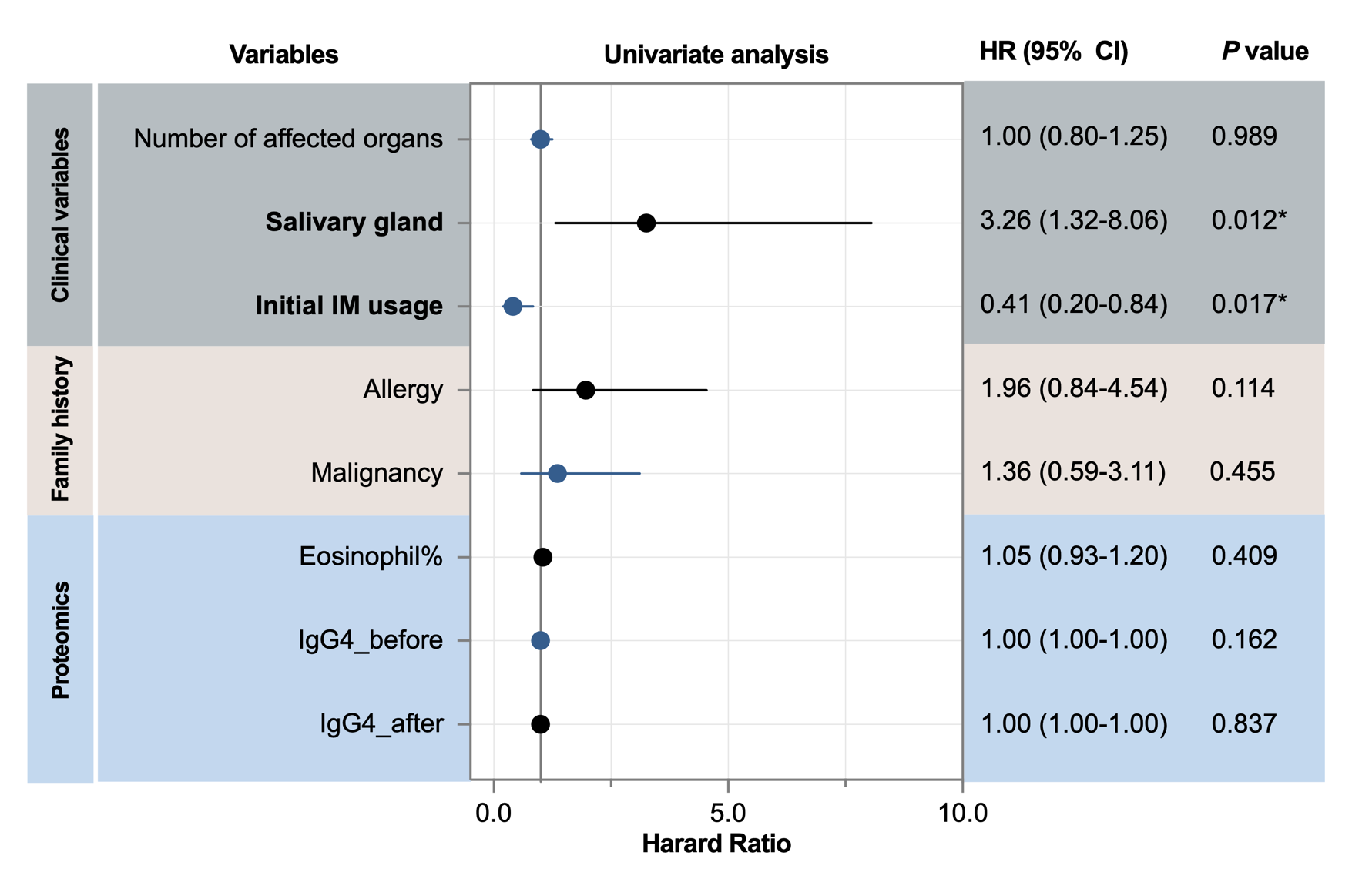Session Information
Session Type: Poster Session B
Session Time: 10:30AM-12:30PM
Background/Purpose: IgG4-related disease (IgG4-RD) is a chronic fibroinflammatory disorder with multi-organ involvement and elevated serum IgG4 levels. Glucocorticoids (GC) with or without immunosuppressants (IM) are the first-line treatment. GC/IM discontinuation carries a 23-41% relapse risk, but prolonged use increases infection risk, making cessation timing crucial. However, identifying patients who can achieve long-term remission remains challenging. This study aimed to investigate the characteristics of patients with and without relapse, identifying factors associated with long-term remission.
Methods: We conducted a retrospective study in China, screening 808 patients diagnosed with IgG4-RD. Eighty patients who achieved clinical remission before drug discontinuation were included in the study. Based on relapse records from the third year after drug cessation, patients were classified into no-relapse group (n = 37) and relapse group (n = 43). All patients fulfilled the 2019 ACR/EULAR classification criteria for IgG4-RD. We analyzed demographic characteristics, laboratory results, clinical symptoms, and treatment data at baseline and during follow-up.
Results: Univariate analysis indicated that the no-relapse group had a lower number of affected organs (p=0.014), family history of allergy (p=0.017), and family history of malignancy (p=0.042). Laboratory findings revealed lower serum levels of eosinophils (p=0.001) and IgG4 (p=0.006) in the no-relapse group at baseline. Patients from the relapse group exhibited higher rates of submandibular (p = 0.009) and parotid glands involvement (p = 0.001).Additionally, the relapse group had more patients without IM prescriptions (p = 0.006). Before complete medication withdrawal, the relapse group exhibited higher serum IgG4 levels (2190 g/L) than the no-relapse group (1250 g/L, p = 0.037).Cox regression analysis identified no salivary gland involvement (HR 3.26, 95% CI: 1.32-8.06, p = 0.012) and initial IM use (HR 0.41, 95% CI: 0.20-0.84, p = 0.017) as significant protective factors (Figure 1). Figure 2 visualized the distribution of relapsed organs. Kaplan-Meier analysis revealed a biphasic relapse pattern following treatment discontinuation, characterized by a plateau after 36 months (Figure 3). These findings suggest that patients remaining relapse-free for 3 years tend to attain durable remission.
Conclusion: IgG4-RD patients without salivary gland involvement and receiving an IM prescription at baseline demonstrated a reduced likelihood of disease relapse following treatment cessation. Furthermore, patients maintaining relapse-free status for 3 years post-treatment exhibited a 94.6% probability of achieving long-term remission, suggesting this timepoint as a meaningful predictor of sustained treatment efficacy.
 Figure 1. Hazard ratios for clinical variables in IgG4-RD relapse prediction
Figure 1. Hazard ratios for clinical variables in IgG4-RD relapse prediction
.jpg) Figure 2. Distribution of relapsed organs
Figure 2. Distribution of relapsed organs
.jpg) Figure 3. Kaplan-Meier curve of relapse-free survival in IgG4-RD patients
Figure 3. Kaplan-Meier curve of relapse-free survival in IgG4-RD patients
To cite this abstract in AMA style:
Wang Y, Nie Y, Li J, Zhang J, Luo Q, Yang X, Jiang J, Zhang N, Peng L, Fei Y, zhou J, Zhang W. Factors Associated With Long-term Remission After Drug Discontinuation In IgG4-related Disease: A 3-Year Rule [abstract]. Arthritis Rheumatol. 2025; 77 (suppl 9). https://acrabstracts.org/abstract/factors-associated-with-long-term-remission-after-drug-discontinuation-in-igg4-related-disease-a-3-year-rule/. Accessed .« Back to ACR Convergence 2025
ACR Meeting Abstracts - https://acrabstracts.org/abstract/factors-associated-with-long-term-remission-after-drug-discontinuation-in-igg4-related-disease-a-3-year-rule/
